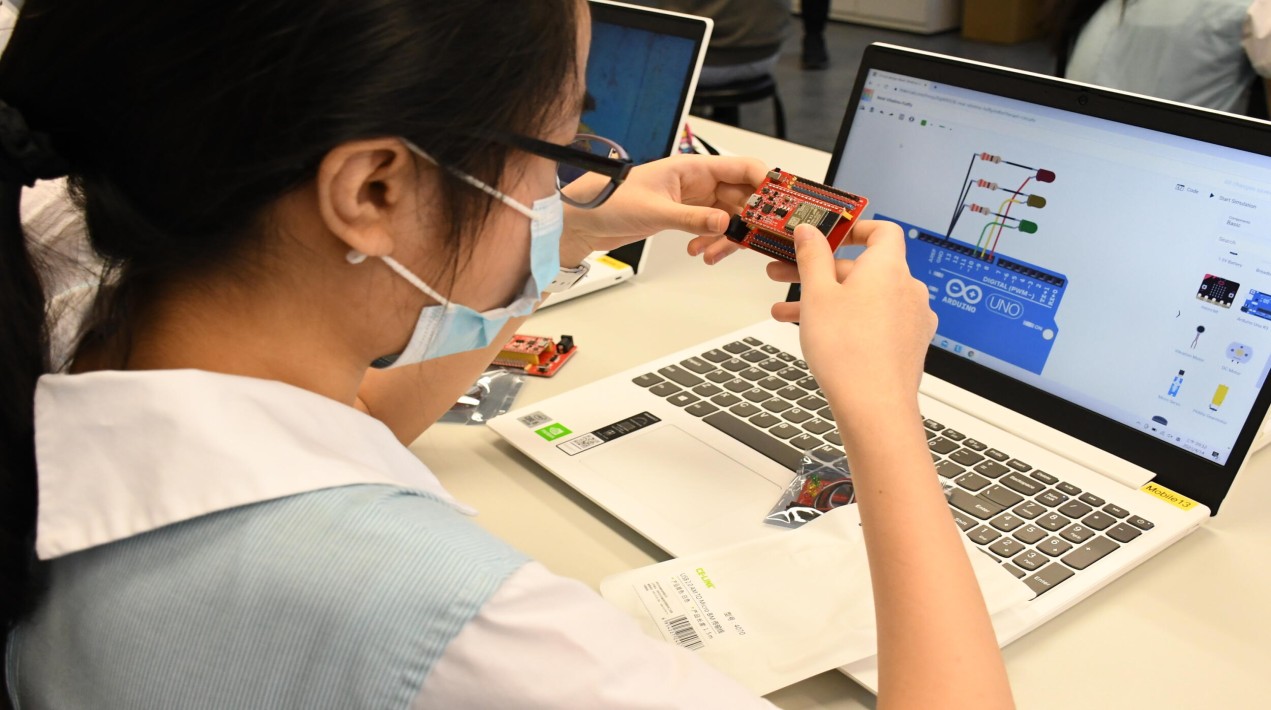
The Jockey Club Community Care and STEM in Action Project, which is funded by The Hong Kong Jockey Club Charities Trust and organised by the Centre for Learning Sciences and Technologies (CLST) of The Chinese University of Hong Kong (CUHK), has accomplished significant results over the past three years.
Six secondary schools participated in the project, and with the help of student mentors from CUHK’s Faculty of Engineering, social service organisations, and entrepreneurs, the students have developed 21 technology-based products tailored to the needs of disadvantaged groups. The project outcomes and products were showcased at the Learning and Teaching Expo 2022 held at the Hong Kong Convention and Exhibition Centre.
The project offered students a comprehensive three-phase curriculum and an interactive platform for STEM education. In the initial phase, students were provided with the latest STEM knowledge and skills and were made aware of the requirements of disadvantaged communities. They then generated ideas for new technology-based products and prepared product proposals based on that.
In the second phase of the project, the proposals were transformed into prototypes under the guidance of undergraduate and postgraduate mentors from the Faculty of Engineering. Representatives from social service organisations and the Hong Kong Automation Technology Council provided support in enhancing the functions and designs of the prototypes. In the final phase, the students fine-tuned and evaluated the prototypes based on user feedback, and enterprises assisted in bringing the products to market.
The end goal of the project was to donate the developed products to underprivileged communities. The hands-on STEM learning platform provided students with a firsthand experience of the “design thinking process” starting from the idea generation, to production, refinement and promotion, giving them a deeper understanding of how a product reaches the market.
The student-developed products aimed to cater to the needs of various marginalised communities by utilising technology to enhance their quality of life. The target beneficiaries of these products include the elderly, individuals with visual and hearing impairments, wheelchair users, and residents of social housing and nano-flats. The products have a wide range of applications that cover various aspects of daily life, including clothing, food, housing, transportation, entertainment, personal care, and communication.
For example, the Bus Reminder, designed by students from Christian and Missionary Alliance Sun Kei Secondary School, emits audio signals to alert the elderly and visually impaired when their bus has arrived at the station. The Necklace, designed by students from Pentecostal Holiness Church Wing Kwong College, detects obstacles and alerts visually challenged users to help protect them. The Railway Safety Device for the Hearing-impaired, designed by students from Carmel Holy Word Secondary School, emits light flashes to assist the hearing impaired in avoiding door crush injuries. The Elevating Wheelchair, designed by students from Lok Sin Tong Yu Kan Hing Secondary School, allows users to adjust the height of the seat for convenience. Another product designed by the same school, the Ventpro, is a compact air purifier designed for small-home residents.
The Principal Investigator of the Jockey Club Community Care and STEM in Action Project and Director of CLST stated that the Jockey Club Community Care and STEM in Action Project has a well-designed, three-phase curriculum and an interactive platform that allows for real-life STEM learning.
The project enables students to use their creativity and innovative technologies to create practical products for marginalised communities to address their everyday issues. This learning experience not only expands students’ perspectives but also fosters their sense of social responsibility and the value of caring, he said.
















